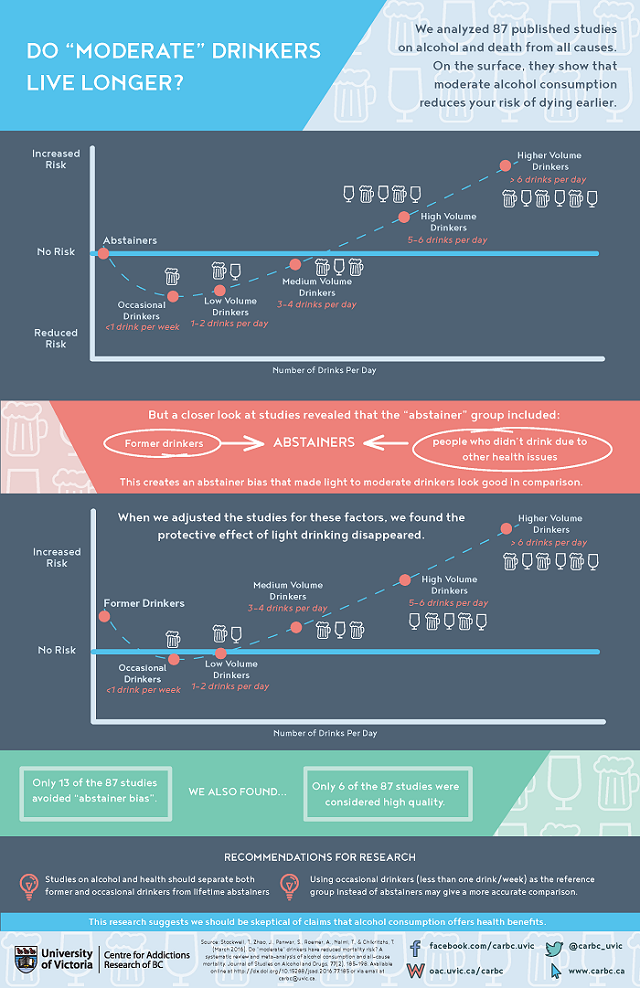Moderate Alcohol Consumption May Not Offer Any Health Benefits After All; Claims May Be Based On 'Flawed' Science

Drinking a couple of glasses of wine at the end of the day is an indulgence you can feel good about — at least that’s what science says. Countless studies have linked moderate drinking to a variety of health benefits, including a reduced risk of heart failure and a longer life. Some researchers have even claimed that drinking moderately is healthier than not drinking at all. But what if these studies are wrong? A new research analysis published in the Journal of Studies on Alcohol and Drugs found that the scientific evidence backing these claims are “shaky at best.”
“There’s a general idea out there that alcohol is good for us, because that’s what you hear reported all the time,” said Dr. Tim Stockwell, lead author of the analysis, in a statement.”But there are many reasons to be skeptical.”
If there are people who have seen health benefits while moderately drinking, alcohol may not be responsible for this improved wellbeing, the study suggests.
Does Moderate Drinking Lower Death Risk?
According to the new analysis, many of the 87 studies Stockwell's team reviewed tying moderate drinking to a healthier life were flawed, “with designs suggesting benefits where there were likely none,” they wrote. These inaccuracies stem from how studies defined “abstainers,” or people who don’t consume alcohol.
Studies focused on this topic typically compared moderate drinkers, or those who have up to two drinks daily, with abstainers. The issue is that the abstainer groups can include people who have had to abstain from drinking because of their poor health. It goes without saying that people who are not healthy tend to have a shorter lifespan, especially if they are suffering from a serious chronic condition. This could mean that people in the abstainer group are more likely to die sooner and have deteriorating health, making it appear as though alcohol is extending the lifespan of moderate drinkers and making them healthier.
“A fundamental question is, who are these moderate drinkers being compared against?” said Stockwell, director of the University of Victoria’s Center for Addictions Research in Canada.
After correcting the abstainer “biases” and certain design issues in the studies they reviewed, the researchers found that moderate drinkers no longer had an advantage in terms of longevity. They also noted that there were only 13 studies that avoided this kind of bias, and their results showed no health benefit to consuming alcohol moderately.
Another important finding was that before the corrections were made, researchers found occasional drinkers, those who consumed less than one drink per week, lived the longest. “Those people would be getting a biologically insignificant dose of alcohol,” Stockwell added. This means people who consume little to no alcohol lived longer than moderate drinkers, which is almost a contrast to studies that claim alcohol consumption offers health benefits.

Don't Credit The Alcohol for Your Health
Even if moderate drinking was associated with longevity, it’s unlikely that alcohol itself deserves the credit.
A previous study found that people who consume two or three glasses of wine daily were healthier than people who don't drink: they had lower rates of heart disease, obesity, and depression than their counterparts who abstained from alcohol entirely. Unlike other studies that have returned similar results, researchers said their findings had less to do with alcohol content and more to do with social status.
Researchers said people who drink alcohol without overindulging tended to be wealthier and take better care of themselves. “Moderate alcohol intake is a powerful marker of a higher social level, superior general health status and lower cardiovascular risk,” said lead author Boris Hansel, according to Independent.ie.
The current research suggests there has been a series of confirmation biases in research examining the health benefits of moderate alcohol consumption. Each year a batch of studies comes out concluding that moderate consumption of alcohol is good for your health, and another batch refutes these claims, saying moderate drinking raises blood pressure and increases risk of stroke and heart attack.
It seems the verdict is still out on the health effects of moderate drinking. There may not be any significant health benefits associated with moderate alcohol consumption but that doesn’t mean you should totally rule out that glass of wine with dinner. Drinking a little alcohol every now and then doesn’t hurt.
Source: Stockwell T, Zhao J, Panwar S, Roemer A, Naimi T, Chikritzhs T. Do “Moderate” Drinkers Have Reduced Mortality Risk? A Systematic Review and Meta-Analysis of alcohol Consumption and all-Cause Mortality. Journal of Studies on Alcohol and Drugs. 2016.
Published by Medicaldaily.com



























